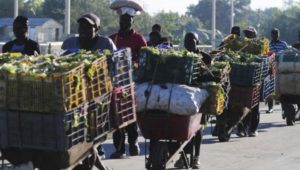
The presidents of the Dominican Republic and Haiti agreed Tuesday to normalize bilateral relations.
Tensions between the two neighbors flared over the summer when the Dominican Repulic began deporting Haitians who could not prove their legal status.
“It was decided that the Haitian government will send a new ambassador to the Dominican Republic in the coming days,” said Andrés Navarro, foreign minister of the Dominican Republic. “At the same time, the Dominican government will return its Ambassador Rubén Siliéin to Haitian territory.”
During the Tuesday meeting, the country’s leaders also discussed their bilateral trade relations, which came to a halt earlier this month when Haiti slapped new restrictions on overland trade with its island neighbor.
The Dominican Republic’s Trade Minister, José Del Castillo Saviñon, warned that the sanctions would result in US$500 million in lost revenue per year to Dominican exporters who would be forced to ship their exports to Haiti via sea or air, which is up to five times more expensive.
As part of the discussions, the two governments agreed on “an accord to enhance commercial trade and normalize ground transport of goods,” according to a memorandum of understanding. Haiti is the Dominican Republic’s second-largest commercial partner after the United States.
Bilateral tensions between the two Caribbean nations reached a peak in September 2013, when the Dominican Constitutional Tribunal ruled that descendants of undocumented foreign nationals were ineligible for Dominican nationality, leaving more than 200,000 Haitian-Dominicans stateless.
Following the ruling, the Dominican Republic government announced an immigration naturalization program, which provides undocumented immigrants with the opportunity to register with the immigration authorities.
The registration process allowed 50,000 of Haitian immigrants to remain in the country, but the majority were unable to finish the process in time as documents were slow to arrive from Haiti and Dominican registration offices were overwhelmed by crowds.
Read more at telesurtv.com

